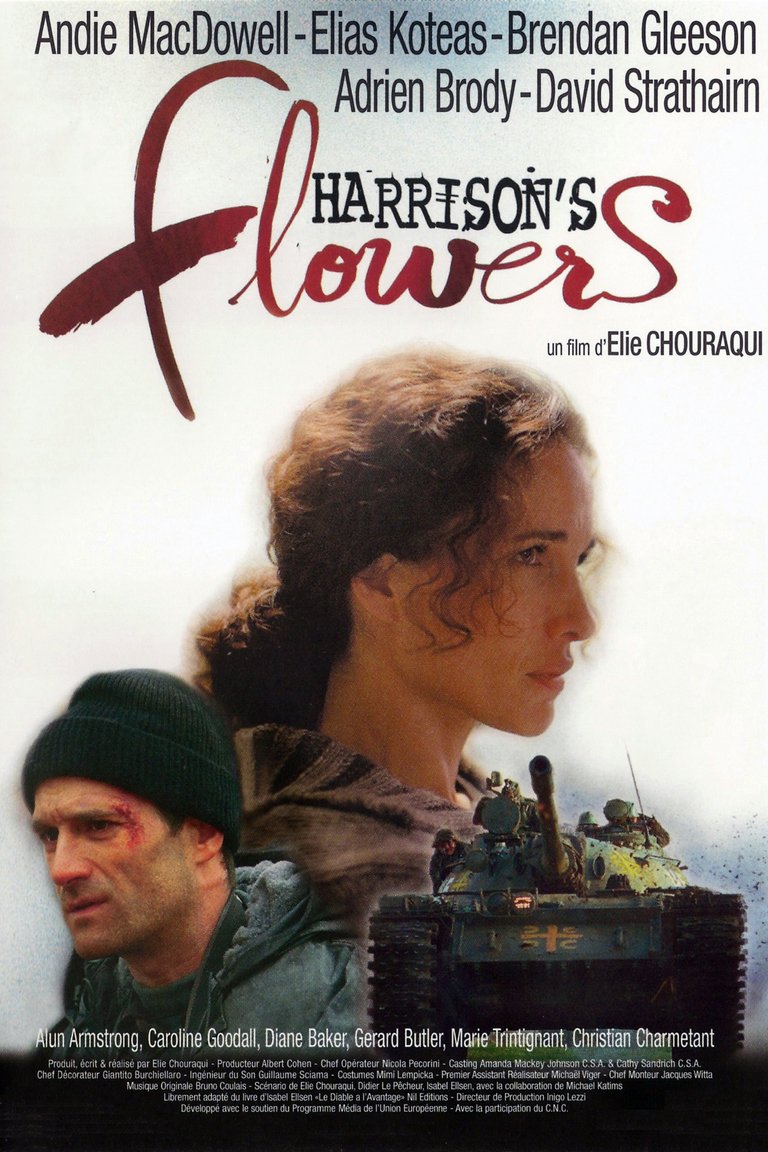Film Review: Harrison's Flowers (2000)

Dissolution of Yugoslavia included a number of wars, some being more interesting to Western media and filmmakers than others. While most people since 1992 knew or pretended to know about Bosnia and the plight of Sarajevo, few bothered to pay attention to the war that had erupted a year earlier in neighbouring Croatia and ran in parallel with the conflict in Bosnia. This was reflected in the number of Hollywood or European productions dedicated to Bosnia, while the war in Croatia was all but ignored. One of the rare exceptions was Harrison's Flowers, a 2000 French drama directed by Élie Chouraqui.
The film is based on Le Diable a l'avantage ("The Devil Has the Advantage"), a 1995 novel by French journalist Isabel Ellsen, partially inspired by her experiences as a photojournalist during the Yugoslav Wars. The plot begins in 1991 New Jersey. The protagonist is Sarah Lloyd (played by Andie MacDowell), photo editor of a US news magazine whose husband Harrison (played by David Strathairn) is a Pulitzer Prize-winning photojournalist working for Newsweek. He has built a career reporting from various war-torn areas of the globe, thus spending a lot of time away from his family and neglecting his young son Cesar (played by Scott Michael Anton). He promises that he would end his career and try to stay home, but before it happens he would have to cover a new crisis that erupted in Europe. Croatia is seceding from Yugoslavia, which has triggered tensions, rumours about armed conflict between the Serb-dominated Yugoslav People's Army and Croat militias, as well as accusations of Serbs committing ethnic cleansing on occupied Croatian territories. Harrison arrives in Croatia and soon disappears with anyone believing that he is dead. Sarah, however, thinks otherwise and goes on a desperate search for her husband whose last location was somewhere around the east Croatian city of Vukovar, which is becoming a major battleground. She is joined in her quest by three experienced war correspondents – Yeager Pollack (played by Elias Koteas), Marc Stevenson (played by Brendan Gleeson) and Kyle Morris (played by Adrien Brody). But even their experience can hardly prepare them for scenes of destruction from the Yugoslav war machinery nor mass rapes and murder of innocent women and children committed by Serb forces.
Harrison's Flowers was greeted with a lot of enthusiasm in Croatia. It can be explained not only by showing the war which outcome Croatians see as their country's greatest achievement in the past few centuries, but also by clearly taking the Croatian side. Croats in the film are shown as victims and Serbs are shown as genocidal monsters. The character of Kyle Morris, the most idealistic reporter of the trio (played by Adrien Brody in an energetic performance that could be seen as something of a test run for his role in The Pianist), expresses sentiments similar to the Croatian public in the 1990s, disgusted with the way Western governments were indifferent towards the brutal ethnic slaughter and unwilling to do anything to stop it. The war itself is shown in a number of scenes that represent the best part of the film. Although made with a relatively low budget and on Slovakian locations, those scenes reconstruct military operations in Eastern Slavonia in a rather impressive manner, although some details, like Yugoslav forces carrying the flag of the Socialist Republic of Croatia, might be seen as unforgivable goofs by those familiar with local history. Chouraqui also doesn't shy away from showing atrocities and those scenes, although not too graphic, might turn away some of the more sensitive viewers. Somewhat ironically, Harrison's Flowers became the subject of controversy in Croatia, mainly due to right-wing nationalist politicians being displeased with the film waiting for three years to be released, which was the subject of all kinds of conspiracy theories directed at the centre-left government of Ivica Račan and his alleged anti-Croatian and neo-Yugoslav stance.
All those claims, however, don't look very convincing in light of Harrison's Flowers failing to have much impact even when properly distributed. As a French film it didn't get a US distributor until 2002 and, by that time, 9/11 and new geopolitical circumstances have turned its subject matter into yesterday's news. Its serious tone made it look less attractive than Serbian and Bosnian films that took something of a more humorous approach like Pretty Village, Pretty Flame or No Man's Land. And Harrison's Flowers looks less interesting when it doesn't deal with the war and instead focuses on the more personal drama of Sarah and her husband. In those segments, which take a relatively great part of the running time, the film is slow, meandering and unattractive and the audience gets the impression that the authors cared more about the fate of professional journalists than innocent civilians. This trap, that the similarly-themed The Killing Fields mostly avoided, makes Chouraqui's film disappointing. It still deserves a recommendation by showing one unpleasant chapter of history and reminding today's audience that humanity three decades ago, just like today, failed to learn some important lessons from history.
RATING: 5/10 (++)
_
Blog in Croatian https://draxblog.com
Blog in English https://draxreview.wordpress.com/
InLeo blog https://inleo.io/@drax.leo
InLeo: https://inleo.io/signup?referral=drax.leo
Unstoppable Domains: https://unstoppabledomains.com/?ref=3fc23fc42c1b417
Hiveonboard: https://hiveonboard.com?ref=drax y
Bitcoin Lightning HIVE donations: https://v4v.app/v1/lnurlp/qrcode/drax
Rising Star game: https://www.risingstargame.com?referrer=drax
1Inch: https://1inch.exchange/#/r/0x83823d8CCB74F828148258BB4457642124b1328e
BTC donations: 1EWxiMiP6iiG9rger3NuUSd6HByaxQWafG
ETH donations: 0xB305F144323b99e6f8b1d66f5D7DE78B498C32A7
